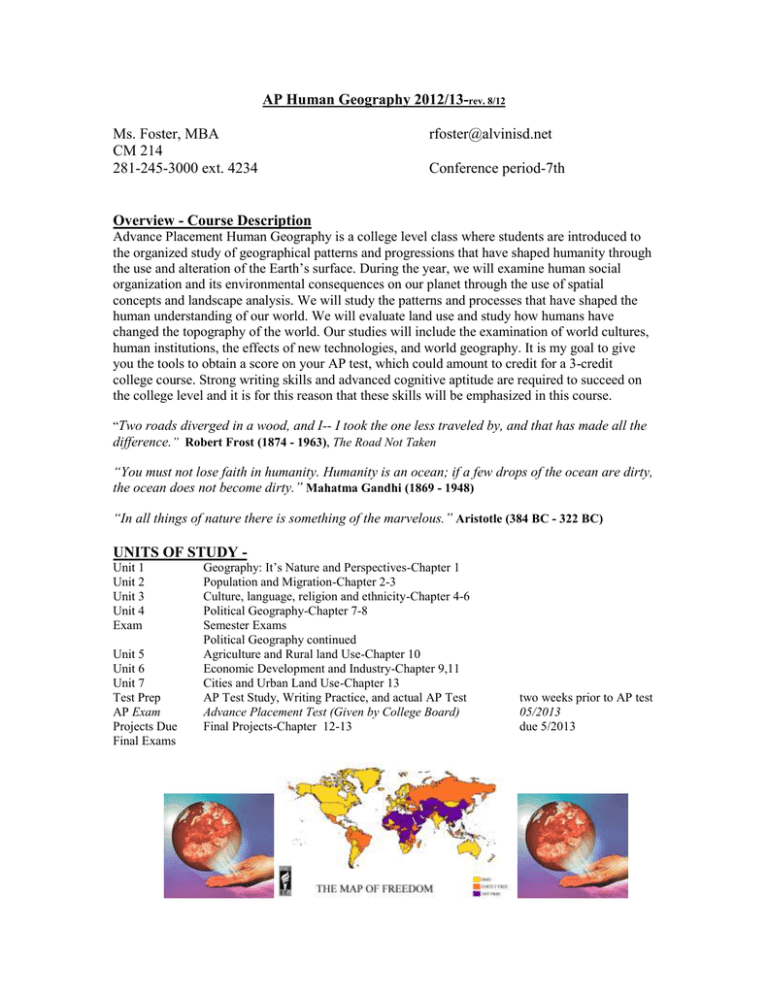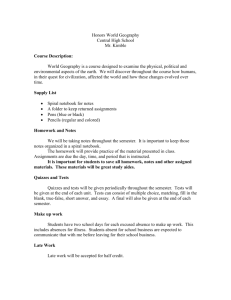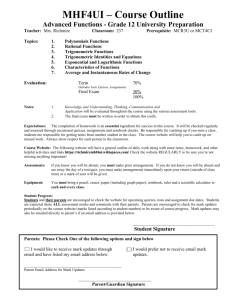AP Human Geography
advertisement

AP Human Geography 2012/13-rev. 8/12 Ms. Foster, MBA CM 214 281-245-3000 ext. 4234 rfoster@alvinisd.net Conference period-7th Overview - Course Description Advance Placement Human Geography is a college level class where students are introduced to the organized study of geographical patterns and progressions that have shaped humanity through the use and alteration of the Earth’s surface. During the year, we will examine human social organization and its environmental consequences on our planet through the use of spatial concepts and landscape analysis. We will study the patterns and processes that have shaped the human understanding of our world. We will evaluate land use and study how humans have changed the topography of the world. Our studies will include the examination of world cultures, human institutions, the effects of new technologies, and world geography. It is my goal to give you the tools to obtain a score on your AP test, which could amount to credit for a 3-credit college course. Strong writing skills and advanced cognitive aptitude are required to succeed on the college level and it is for this reason that these skills will be emphasized in this course. “Two roads diverged in a wood, and I-- I took the one less traveled by, and that has made all the difference.” Robert Frost (1874 - 1963), The Road Not Taken “You must not lose faith in humanity. Humanity is an ocean; if a few drops of the ocean are dirty, the ocean does not become dirty.” Mahatma Gandhi (1869 - 1948) “In all things of nature there is something of the marvelous.” Aristotle (384 BC - 322 BC) UNITS OF STUDY Unit 1 Unit 2 Unit 3 Unit 4 Exam Unit 5 Unit 6 Unit 7 Test Prep AP Exam Projects Due Final Exams Geography: It’s Nature and Perspectives-Chapter 1 Population and Migration-Chapter 2-3 Culture, language, religion and ethnicity-Chapter 4-6 Political Geography-Chapter 7-8 Semester Exams Political Geography continued Agriculture and Rural land Use-Chapter 10 Economic Development and Industry-Chapter 9,11 Cities and Urban Land Use-Chapter 13 AP Test Study, Writing Practice, and actual AP Test Advance Placement Test (Given by College Board) Final Projects-Chapter 12-13 two weeks prior to AP test 05/2013 due 5/2013 Course Objectives Examine the discipline of geography, including its tools, themes, and concepts. Utilize and evaluate maps and spatial data. Define regions and evaluate the regionalization process. Characterize and analyze changing interconnections among places. Evaluate geographic problems on the global, national, and local scale. Identify and interpret at different scales the relationships among patterns and processes. Assess the nature and significance of phenomena that occur in the same place. Analyze the diversity of global cultures and their economic characteristics. Recognize how tastes and values, political regulations, and economic constraints work together to create particular types of cultural landscapes. Examine how cultural landscapes are shaped and how they change over time. GRADES - Grading Format (Per nine weeks) Your final grade is based on your capacity to demonstrate your ability to perform the objectives and required skills for each unit. You will be assessed based on value points on the basis of unit exams, essays and FRQ’s, worksheets, projects, quizzes, notebooks, research papers & presentations, group presentations, group projects, cases studies, simulations and homework assignments. Type of Evaluation Percentage % Value 60% Research Papers and Research Presentations, individual and group projects) Formative Assessments (Quizzes, in class assignments, Worksheets, 20% Summative Assessments (This includes mostly Unit Exams, Simulations, Case Studies) Homework (Graded on accuracy or quality in relation to established learning outcomes.) 20% There will be due dates and deadlines for assignments. Per AISD AP guidelines, no work is accepted late. Essays/practice FRQ’s (free response questions) From time to time, you will be given an essay to complete at home that critiques a subject of discussion. Sometimes the assignment will be given as a handout and other times it will come from the companion website to the book. Assignments given as handouts need to be hand written. Worksheets These assignments will normally be due the next day of class, unless specifically noted by the teacher, the assignment is an individual obligation. Collaboration with other classmates will not help you learn the material and will be considered cheating. Cheating is a serious offence and all parties will receive a 0, without exception. Quizzes It can be argued that your greatest tool for success in this course is the textbook. It is for this reason that you will be quizzed after Friday. Quizzes may be given in any format and can vary in duration. Each reading assignment will be one to two chapters in length. You are highly encouraged to read the chapter more than once in order to help you understand and retain the large amounts of information in each chapter. Research Paper & Presentations You many be given and assignment to research and write a paper. The paper will need to be a least 5 pages and no more than 8 pages. A coversheet and a bibliography will need to be attached and will not be included in the minimum and maximum page requirements. All research papers must be typed and double-spaced in no larger, or smaller, than a font equivalent in size to a 12 point “Times New Roman.” Late Research Papers Will Not Be Accepted After the Deadline! A minimum of six sources will be required. You will also need to give a short presentation on the findings of your paper. You are expected to find an interesting and unique way to present your findings to the class. Understand that I am very Internet savvy and I do check for plagiarism. Plagiarism is illegal and unethical! A paper with any degree of plagiarism will receive a grade of 0! (All research subjects must be cleared with me.) Notebook This is a collection of all your work in this course. You must keep all your work, neatly in this notebook, regardless of the previous grade received. The notebook is your study guide for the AP Exam. You need a 2-inch binder with seven dividers. Notebooks may be checked without warning, so it must be brought to class everyday. There will be a deduction for any missing work. All work must be dated and in chronological order. Dividers must be properly labeled by each of the 7 units of study. **Remember to keep a hard copy of everything you do. ** Group Presentations You will be assigned to a group as we cover each chapter or unit. Groups will be given a topic on selected case studies from each chapter or unit in the book. Groups will be expected to find an interesting and unique way to present their findings to the class. This can be anything from a simple presentation using the board or audio-visual materials, to a game or short skit. Groups may utilize the assistance of the teacher or fellow classmates in their presentations. The use of audiovisual materials is highly encouraged. Late presentations will not be permitted! Groups will be given a specific day that their presentation is due and will vary in size and composition. Therefore you may not work with the same people all the time. Grades will be given individually, based on the individual contribution of each participant. For grading purposes, each person must have evidence of their participation. Projects Occasionally you will be given an assignment to complete, as homework, during class, or in one of the Computer Labs. It is your responsibility to make sure that you have a current and active school computer password. If you do not have an active password now, you need to register for one before or after school with-in a week of the start of class. Class Discussion It is critical that everyone participate in class discussions and class activities in order to get a variety of viewpoints on the subjects that we will be covering. Class discussions are an integral part of this course and every student is required to respond when questioned and encouraged to give input to class discussions. Reassessment Per AISD policy, there is no re-testing in AP classes. Extra Credit-extra implies you have completed all work and will be completing above and beyond the scope of the assessments given during the course of a nine weeks. Each student will have ample assessment opportunities during each grading period. Therefore, extra credit is not necessary. Additionally, any graded papers cannot be corrected by students and resubmitted for a higher grade. Important information if you are Absent You are responsible for the material discussed in class, this includes days you are absent. Bellringers and warm-ups may be excused, but quizzes and tests will not. Make-up tests are your responsibility. When you return remind me that you need a make-up test. Make-up tests will be different and have a different format than the original test.. It is your responsibility to pick up your assignments and turn in your work the day after you return from any absence. Being absent from class does not excuse you from doing the assignment. It is your responsibility to collect and complete missed assignments when you are absent. EXTRA HELP AND COMMUNICATION Course Grades will be posted on online and Course information can always be found on my website. Tutoring time Mon., Tue., or Thursday after school. Electronic devices-Put them away, they are not more important than your grade in Economics. Your purse, backpack, etc must be on the floor during class, NOT on your desk or lap. Your hands must be visible and on your desk. Seven Simple Rules I) Be on time each day. When the bell rings, you must be in your seat or well on your way. If you are standing around outside talking, you will be marked tardy. II) You will be assigned a seat and will be expected to sit in that seat each day. If you are sitting in an unassigned seat, you may be marked absent. III) Be prepared. Bring paper, pen or pencil and your notebook to class each day. You will not be permitted to go leave class or to another classroom to get your notebook or assignments once class has started. IV) Do not bring food, drink, into the classroom. Let’s keep our school clean. It’s an issue of pride. V) It is your responsibility to make sure that your assignments are completed and turned in on time. VI) No one will be allowed to sleep (or put their head down) in class. If you have a health issue, please let me know. Your privacy will be completely respected. VII) School rules will be adhered to strictly. You are expected to know them and follow them. Any variation will result in immediate disciplinary action. Books The textbooks for the course are: An Introduction to Human Geography: The Cultural Landscape ; 9th Edition, by James M. Rubenstein World Geography, by Dr. Richard G. Boehm Additional materials needed: Colored pencils/markers Student atlas







